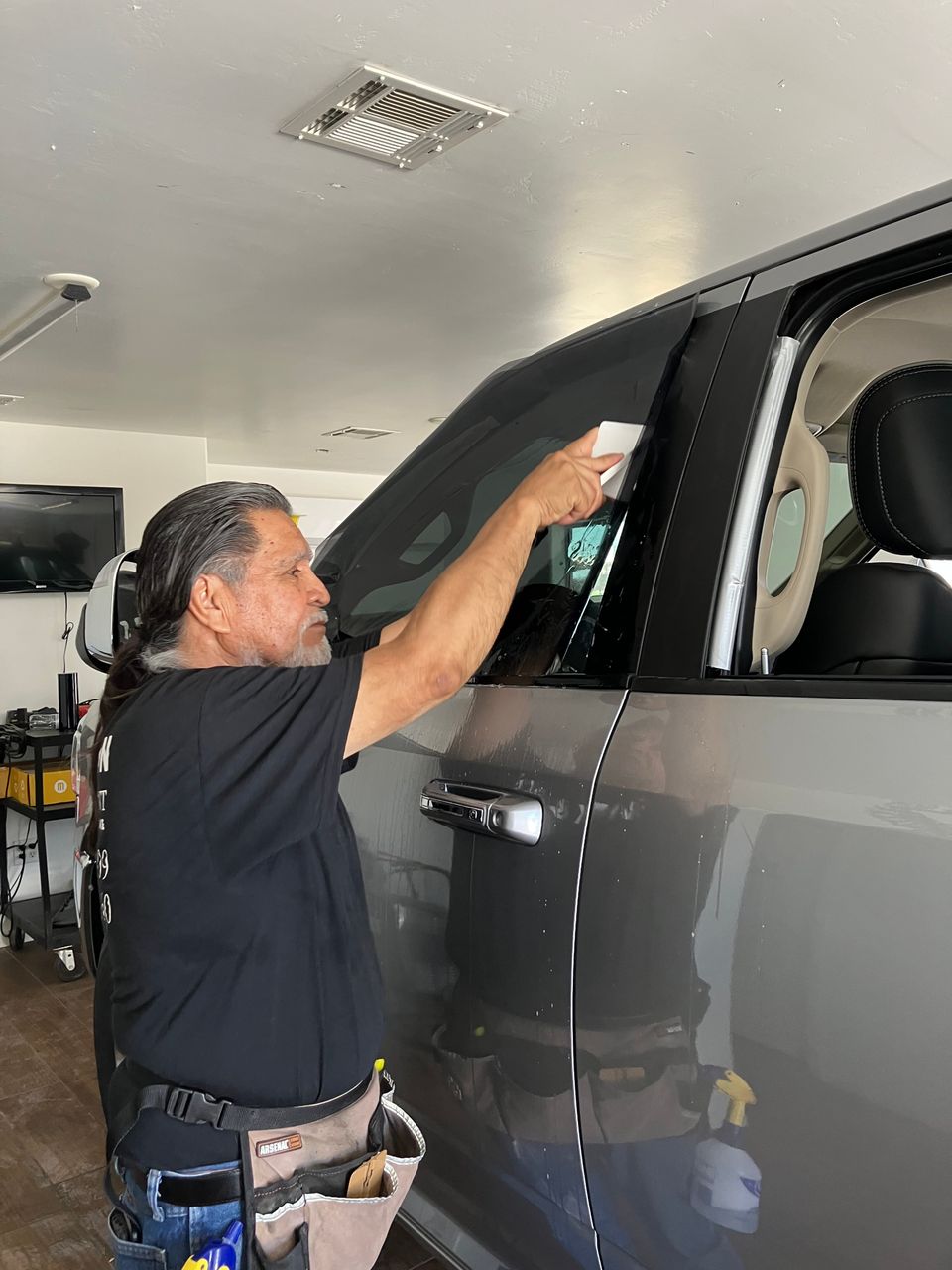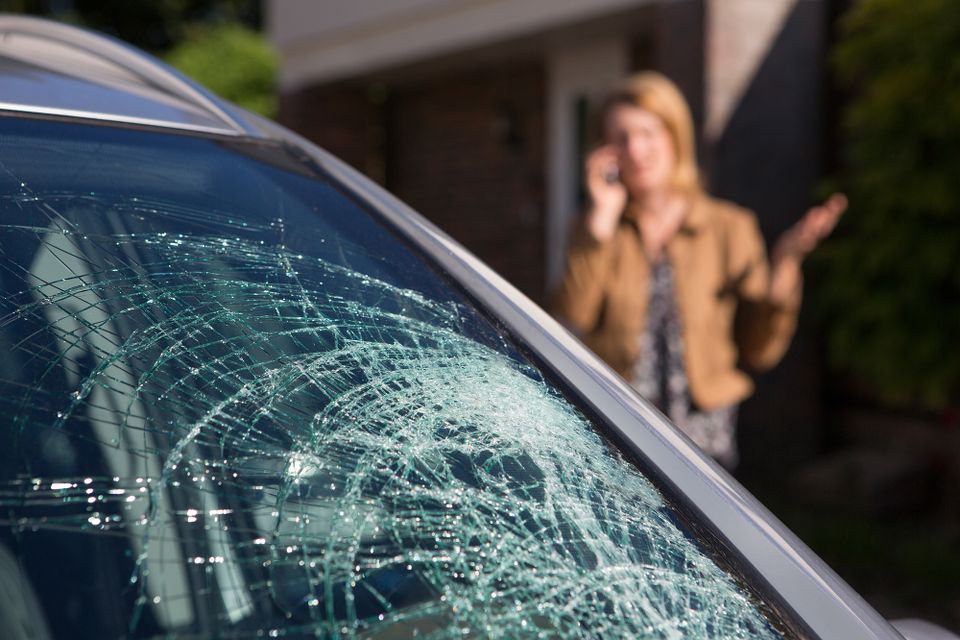
Ceramic Tint vs Regular Tint
A Comprehensive Comparison Window tinting has evolved significantly since its inception many years ago. Once a simple choice between lighter or darker shades, today's window tint options offer a range of features and trade-offs. Among these choices, two types of tint stand out:
Ceramic tint and Regular tint.
However, deciding between them can be confusing. Should you opt for regular tint due to its affordability or choose high-tech ceramic tint for its superior qualities?
Frank & Son Glass/Tint is here to provide clarity on this matter and assist you in making an informed decision.
A Closer Look at Regular Tint Commonly referred to as dyed film, regular tint has been the preferred choice of vehicle owners for a long time. It offers a decent level of privacy and reduces sun glare at an affordable price. Regular window tint works by absorbing some solar heat and UV rays, providing a degree of heat reduction and UV protection. It's a budget-friendly option for vehicle owners looking to add privacy and sophistication to their ride.
However, despite its affordability and aesthetic enhancement, standard tint has some drawbacks. Its UV light and heat rejection capabilities are not as strong as more advanced options like ceramic tint. While it does reduce heat to some extent, it may not be the best choice if you want to keep your vehicle cool.
Standard tint, sometimes referred to as "cheap tint," also lacks significant infrared protection. Infrared radiation is responsible for the sensation of heat from sunlight. Without strong defense against it, even a darker tint may not effectively cool your car.
Before moving on to the next section, it's important to note that while regular tint has its limitations, it remains a viable option for budget-conscious car owners seeking basic benefits like glare reduction and increased privacy.
Ceramic Tint: The Advanced Window Tinting Solution Stepping into the realm of cutting-edge technology, ceramic tint greatly enhances the benefits of window tinting. Utilizing nano-ceramic technology, ceramic window tint offers a multitude of advantages that surpass those of standard tint.
Unlike regular tint, which uses dyes, ceramic window tint incorporates ceramic particles into the film. These nano-ceramic particles play a crucial role in blocking harmful UV rays and rejecting a substantial amount of solar heat. This results in excellent UV protection and heat reduction, ensuring your vehicle remains cool and comfortable, even on scorching summer days.
One of the most notable features of ceramic tint is its remarkable infrared rejection capabilities. Infrared light is the primary cause of the heat felt from the sun. A good ceramic tint can reject up to 90% of solar infrared light, making your drive significantly cooler.
Ceramic tint also excels in color stability, ensuring that your window tint retains its vibrant color for years. Its structural stability prevents bubbling and peeling, common issues with cheaper tints.
Furthermore, ceramic tint minimizes signal interference, allowing your electronic devices to function efficiently even with the tint applied. It also offers superior clarity, maintaining your view while reducing glare from the sun. It's an excellent choice for those seeking a balance between privacy, comfort, and visibility.
In summary, ceramic tint, with its advanced technology and comprehensive benefits, presents a compelling option for car owners seeking high performance and long-lasting durability. However, it's important to note that these premium features come at a relatively higher price compared to regular tint.
Ceramic Tint vs Regular Tint: Making Your Choice Choosing between ceramic and regular window tint is a significant decision that can impact your driving experience, your vehicle's interior lifespan, and the overall look and feel of your car. Let's compare these two options to help you make an informed choice.
Firstly, in terms of UV protection and heat rejection, ceramic tint takes the lead. Its advanced construction blocks nearly 99% of harmful UV rays and rejects a significant amount of solar heat, keeping your ride cooler and safeguarding your car's interior from sun damage. Regular tint, while still offering some UV protection and heat reduction, doesn't match the performance of ceramic tint.
Secondly, the difference in infrared protection between these two types of tints is substantial. Regular tint lacks infrared-rejecting properties, whereas ceramic tint, thanks to its nano-ceramic particles, offers high infrared rejection capabilities, further reducing the heat inside your vehicle.
The disparity in visual appeal and privacy between these two options is also worth considering. Both types of tints come in various shades, allowing you to choose the darkness level that suits your aesthetic and privacy needs. However, ceramic tint provides better clarity, offering a clearer view from inside the car while significantly reducing sun glare compared to regular tint.
In terms of longevity and durability, ceramic tint stands out. While it may come at a higher initial cost, its durability and superior performance can save you from frequent replacements, providing better long-term value.
Regarding legal compliance, both types of tints must adhere to state regulations governing window tint darkness and reflection. It's essential to check your state's specific regulations before making a decision.
While it may seem like ceramic tint is the superior choice, remember that your decision between ceramic and regular tint ultimately depends on your personal preferences, specific needs, and budget. Dyed film can be an excellent choice for those seeking a cost-effective solution, while ceramic tint is ideal for those desiring advanced features and long-lasting performance.
Trust Frank & Son Glass/Tint for a Wide Range of High-Quality Films After delving into the comparison of ceramic tint vs. regular tint, you may still be uncertain about the right choice for your vehicle. That's where Frank & Son Glass/Tint can assist you. As a reputable window tinting company in Atlanta with over three decades of experience, we can guide you through the process and ensure that your tinting project meets your standards and specific requirements.
If you lean towards the advanced technology of ceramic window tinting, explore our premium selection of Ceramic Series Window Film. This innovative nano-ceramic technology delivers maximum heat and UV protection while significantly reducing glare, all without interfering with signals from electronic devices. While ceramic tinting may require a higher upfront investment, it offers superior performance and durability, providing better long-term value.
On the other hand, if you prefer the cost-effective solution of regular or dyed film, we offer a selection of some of the best standard films available. We provide a range of shades to complement your style while offering noticeable UV protection and heat reduction for your car. With our skilled installation and lifetime warranty, our standard tint surpasses the industry's "cheap tint" options.
We understand that every vehicle owner and vehicle is unique, and we take pride in providing tailored solutions to meet your specific needs. From the initial consultation to installation and aftercare, our experienced team is dedicated to delivering an exceptional customer service experience.
Frank & Son Glass/Tint is more than just a window tinting service; we are a trusted partner committed to enhancing your driving experience and prolonging your vehicle's lifespan. With our extensive range of professional services, we aim to address the window tinting needs of every client and ensure a job well done the first time. Whether you opt for ceramic window tint or regular window tint, rely on Frank N Son Glass/Tint for the most reliable automotive films and enduring installation.
Contact us today or schedule your appointment online to transform your driving experience! (928) 446-6109
